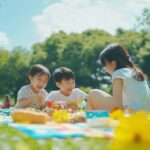As the homeschooling trend continues to rise, many parents are left wondering: Is this choice isolating us too much? Picture this: a mom proudly sharing her daughters’ journey to financial independence through a carefully curated homeschool curriculum, complete with lessons on stocks and compound interest. While this may sound aspirational, it raises an important question about the social implications of homeschooling. Are we sacrificing community connections for the sake of individualized education? In a world where public schools were designed to foster social equality and community engagement, the shift towards homeschooling could lead to a decline in social capital, leaving children—and parents—feeling isolated.
The Social Fabric of Education
Homeschooling may offer flexibility and tailored learning experiences, but it can also create a bubble that limits social interactions. Imagine your child missing out on the everyday dynamics of a classroom—learning to navigate friendships, conflicts, and teamwork. These experiences are crucial for developing social skills and understanding diverse perspectives. While many homeschoolers form groups for socialization, the reality is that not all children have equal access to these networks. What happens to those who are left out? The potential for isolation is a real concern, especially for families who may not have the resources to connect with other homeschooling families.
Finding Balance
So, how can we strike a balance between the benefits of homeschooling and the need for social interaction? Consider integrating community activities into your homeschooling routine. Join local clubs, sports teams, or volunteer opportunities that allow your children to interact with peers outside of their home environment. Think of it as a way to enrich their education while also fostering essential social skills. Remember, the goal is not just to educate but to raise well-rounded individuals who can thrive in a community setting.
Ultimately, homeschooling can be a rewarding choice, but it’s essential to remain mindful of the social implications it carries. Let’s ensure that while we nurture our children’s academic growth, we also cultivate their social connections. After all, a well-rounded education encompasses more than just textbooks; it’s about building relationships that last a lifetime.
Is Homeschooling Isolating Us Too Much?
As the trend of homeschooling continues to rise, many parents are left wondering about the implications of this educational choice. Is it truly beneficial for our children, or does it lead to isolation from the broader community? This article explores the complexities of homeschooling, its impact on socialization, and the potential consequences for families and society.
Introduction
Homeschooling has gained significant traction in recent years, with a reported increase of over 50% since 2017. Once viewed as a niche choice primarily for religious families, it has now become a mainstream option for many parents seeking alternative educational pathways. While the benefits of personalized learning and flexibility are often highlighted, the question remains: does homeschooling isolate families from their communities? This article delves into the nuances of homeschooling, examining both its advantages and potential drawbacks.
The Rise of Homeschooling
Homeschooling is no longer just a choice for a select few; it has become a popular option among various demographics. Influencers and family bloggers are increasingly showcasing their homeschooling journeys, presenting it as an aspirational lifestyle. However, this trend raises concerns about the implications of pulling children out of public schools, which serve as vital social equalizers in our communities.
Socialization: The Homeschooling Debate
One of the most common criticisms of homeschooling is the potential lack of socialization opportunities for children. Critics argue that without regular interaction with peers in a traditional school setting, homeschooled children may miss out on essential social skills. However, many homeschooling families actively seek out social opportunities through co-ops, extracurricular activities, and community events.
On the other hand, proponents of homeschooling argue that traditional schools can often foster environments of conformity and obedience, stifling individuality. They contend that homeschooling allows for more meaningful interactions and deeper connections with family and friends. The reality is that socialization can take many forms, and each homeschooling family navigates this aspect differently.
Personalized Learning vs. Professional Teaching
While many parents are passionate about teaching their children, it’s essential to recognize that effective teaching is a skill that requires training and experience. The desire to be both a parent and a teacher can lead to a blurred line between nurturing and instructing. Parents may find themselves overwhelmed by the responsibility of delivering a comprehensive education, which can lead to frustration and burnout.
Moreover, the idea that anyone can teach simply because they are a parent can be misleading. Quality education often involves a level of expertise that goes beyond basic literacy and enthusiasm. This raises questions about the long-term implications of homeschooling on children’s educational outcomes.
The Impact on Community and Social Capital
Robert Putnam’s research on social capital highlights the importance of community engagement and relationships in fostering a healthy society. As families increasingly choose homeschooling, there is a risk of diminishing social capital, as fewer children participate in communal activities that build trust and reciprocity. The loss of these connections can have far-reaching consequences for both individuals and communities.
When families opt out of public schooling, they may inadvertently contribute to the erosion of community ties. Schools serve as hubs for social interaction, where children learn to navigate diverse social dynamics. The absence of these experiences can hinder children’s ability to engage with the world around them, potentially leading to a generation that is less connected and less civically engaged.
Homeschooling Influencers: A New Industry
The rise of homeschooling has also given birth to a new industry of influencers and content creators who monetize their experiences. Many family influencers pivot to homeschooling content as their children grow, capitalizing on the demand for homeschooling resources. This trend raises questions about the motivations behind homeschooling and whether it is genuinely about education or more about branding and income generation.
As influencers curate their family narratives, they often present an idealized version of homeschooling that may not reflect the challenges many families face. This can create unrealistic expectations for parents considering homeschooling, leading to feelings of inadequacy when their experiences do not align with the polished portrayals seen online.
Conclusion: Finding Balance
Homeschooling can offer unique opportunities for personalized education and family bonding, but it also poses challenges related to socialization and community engagement. As parents navigate this choice, it is crucial to consider the broader implications for their children and society as a whole. Striking a balance between individualized learning and maintaining connections with the community is essential for fostering well-rounded, socially adept individuals.
Ultimately, the decision to homeschool should be made with careful consideration of both the benefits and potential drawbacks. By actively seeking out social opportunities and engaging with the community, homeschooling families can mitigate the risks of isolation while still enjoying the advantages of a tailored educational experience.

| Key Points | Details |
|---|---|
| Rise of Homeschooling | Homeschooling has surged by over 50% since 2017, becoming a mainstream and aspirational choice among families. |
| Individualism vs. Community | The shift towards homeschooling reflects a broader trend of individualism, potentially undermining public schooling as a community equalizer. |
| Social Isolation Concerns | Critics argue that homeschooling can lead to social isolation for children, although many homeschoolers actively participate in community groups. |
| Teaching Quality | Effective teaching requires skill; the belief that any parent can teach effectively may overlook the complexities of education. |
| Impact on Civic Engagement | Homeschooling may influence children’s understanding of civic duties and community participation, raising concerns about future democratic engagement. |
| Influencer Culture | Many family influencers are pivoting to homeschooling content as a new revenue stream, blending education with monetization. |
| Social Capital | The decline in community engagement and social capital is a significant concern, as relationships built in schools contribute to societal well-being. |



